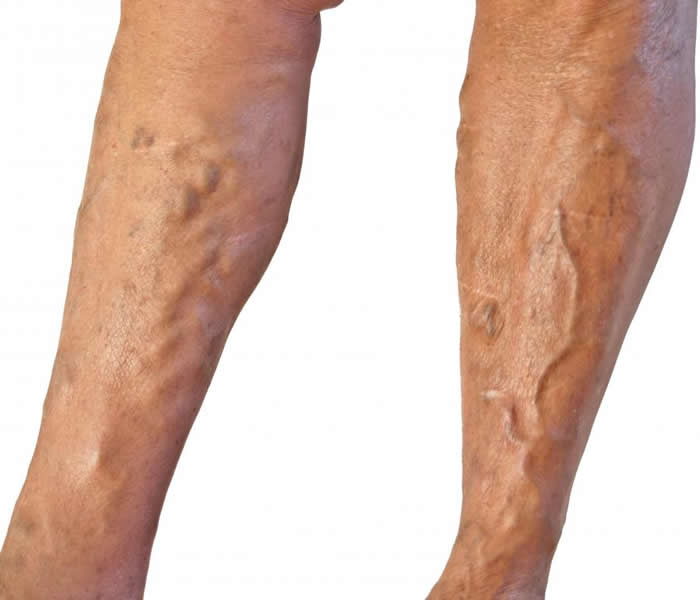Varicose Veins
What are varicose veins?
Veins are blood vessels that return deoxygenated blood from the outer parts of the body back to the heart and lungs. When veins become abnormally thick, full of twists and turns, or enlarged, they are called varicose vein. This happens most commonly in the veins in the legs and thighs.
Varicose veins are veins that are swollen, twisted, and often painful. They are often seen on the legs of older people and of women who are pregnant or who have had many children.

Causes of Varicose veins
The main cause is defective/damaged valves within the veins. These can also cause it:-
- Age: Generally, most elderly individuals show some degree of varicose vein occurrence.
- Chronic heart valve conditions, which are usually congenital
- Menopause
- Obesity, which adds weight to the body and increases the pressure on the legs
- Pregnancy
- Pressure on the midsection of the body, especially the abdomen
- Standing for long periods of time
Symptoms/Signs of Varicose veins
- Aching, heavy and uncomfortable legs
- Swollen feet and ankles
- Burning or throbbing in your legs
- Muscle cramp in your legs, particularly at night
- Dry, itchy and thin skin over the affected vein
How to diagnose varicose veins
Physical Examination
Diagnostic Tests
Duplex Ultrasound
Your doctor may recommend duplex ultrasound to check blood flow in your veins and to look for blood clots.
How to Prevent Varicose veins

- Start by working out. “Exercise helps control weight and keep leg muscles fit. You can involve yourself in exercise such as like swimming and biking.
- Make sure that you are taking a lot of fruit.
- Sit with your legs propped higher than your heart for 10 to 15 minutes to help drain any pooled blood after your normal daily activities.
- If visible veins of leg run in your family, consider wearing support hose as often as possible.
Treatment for Varicose veins
- Do not spend much time standing or sitting with your feet down. If you have no choice but to sit or stand for long periods, try to lie down with your feet up (above the level of the heart) for a few minutes every half hour.
- When standing, try to walk in place. Or, repeatedly lift your heels off the ground and put them back down.
- Also, sleep with your feet up (on pillows).
- Use elastic stockings (support hose) or elastic bandages to help hold in the veins. Be sure to take them off at night.
- Taking care of your veins in this way will help prevent chronic sores or varicose ulcers on the ankles
Varicose veins Home Remedies/Home Cure
Alcohol
Avoid alcohol in take
Antioxidant Substances
The tiny seeds inside grapes contain antioxidant substances, including several types of flavonoids, linoleic acid and vitamin E.
They prevent free radical damage to the walls of the blood vessels. They also promote the formation of collagen, a protein that helps maintain the elasticity of connective tissues and strengthen the walls of the blood vessels. It prevents leakage of fluid from the veins and resultant swelling of the legs.
Compression
Applying uniform pressure on the legs with specially designed compression stockings is a tried and tested remedy for varicose veins.
Mud packs
Applying a mudpack to varicose affected legs may help reduce vein enlargement. Significant reduction in pain is often reported after mud pack treatment.
Vitamin
You need a lot of vitamins for your body such vitamins like B12,vitamin B6, folate can benefit people with varicose veins.This you can get mainly from foods like Tuna, salmon, shrimp, chicken, turkey, and egg. Sweet potatoes, potatoes, sunflower seeds, avocados, bananas, broccoli, lentils, and lima beans are also good vegan sources.
Complications of Varicose veins
Complications of varicose veins, though not common, are:
Ulcers: Extremely painful ulcers may lead to varicose veins, particularly near the ankles. Ulcers are caused by long-term fluid buildup in these tissues, caused by increased pressure of blood within affected veins.
Bleeding: Occasionally, veins that are very close to the skin may burst. This usually causes only bleeding.
Blood clots: Occasionally, veins deep within the legs become enlarged. In such cases, the affected leg may swell considerably. Any sudden leg swelling warrants urgent medical attention because it may indicate a blood clot — a condition known medically as thrombophlebitis.




